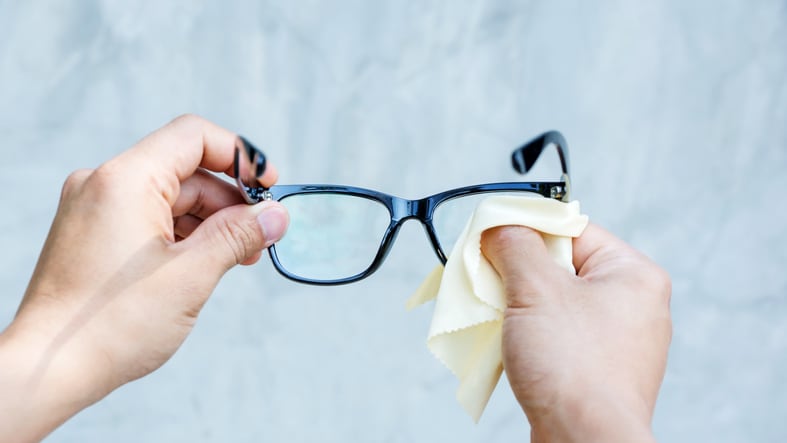-
Glasses Cleaning and Care Tips

Eyeglasses aren’t just an important tool for improving your vision- they’re an investment. Once you’ve found the right pair, you’ll want to take excellent care of them, so that they’ll last a long time and keep you seeing clearly. Here, we offer some glasses cleaning and care tips to help you care for your glasses the right way, not just to keep them clean, but also to prevent scratches and other damage.
First things first: some dos and don’ts for keeping your lenses sparkling clean.
- Do start with clean hands. Before you ever touch your eyeglasses, wash and dry your hands thoroughly. Make sure to use lotion free soap and dry with a clean, lint-free towel if you’re going to be working with your glasses.
- Don’t pull off your glasses and rub them with your shirttail. Your clothing can have dust, debris, and particles that can scratch your glasses. Using a microfiber cloth designed to clean glasses is a better bet, but a dry cloth is still not as good as water.
- Do use lukewarm water to rinse your glasses. Hot water can damage some eyeglass coatings, but lukewarm water will go a long way toward removing the dust and debris that can scratch your lenses when you’re cleaning them.
- Don’t use saliva to clean the lenses. Your spit is not going to do a good job, and it’s also not hygienic.
- Do use lotion-free dishwashing liquid to help get them really clean. Use only a small amount, because dishwashing liquids are typically very concentrated. Gently rub the lenses on both sides, then clean all parts of the frame, including the nose pads and the part that goes behind your ears.
- Don’t use household glass or surface cleaners on eyeglasses. The chemicals used in these products can damage the coating on your glasses.
- Do rinse away all traces of soap. If soap is left on your lenses, they’ll smear when you dry them.
- Dry with a shake and a polish. Shake the glasses to get most of the water off of the lenses, then look them over carefully to make sure they’re clean. Using a clean, lint-free towel that hasn’t been laundered with a dryer sheet, carefully dry the frames and lenses. Make sure the towel is completely clean, because dust, dirt, cooking oil, or any other substance can cause scratches on your lenses. If any spots remain, gently buff them with a clean microfiber cloth.
- Don’t use random fabrics to clean your lenses. Paper towels, tissues, napkins, and toilet paper can all leave your glasses linty, scratched, or smeared.
Now that you know how to clean your glasses, how can you keep them free of scratches? When you purchase glasses, opt for scratch resistant coating, to make it easier to keep them from harm. Further, one of the most important things you can do is to make a rule for yourself: if they’re not on your face, they’re in their case.
Remember, no pair of eyeglasses will last forever. Over time, normal use and exposure to the environment is bound to create a few scratches. Occasionally, you’ll probably even drop or misplace your eyeglasses. Even with scratch resistant coating, your glasses are no scratch proof. Your eye care provider can help you with an anti-scratch warranty for your lenses, but ultimately, you’re going to need to replace them because scratches in the lenses can irritate your eyes.
When it’s time to get new glasses, it’s time to have a complete eye exam to make sure you’re using the right prescription. If you are looking for an eye doctor, the Gerstein Eye Institute in Chicago can help. Since 1968, the Gerstein Eye Institute has been providing exceptional ophthalmologic care to patients in the Chicago area. With decades of experience in ophthalmology, our certified professional staff members work hard to provide the kind of personalized care that keeps patients coming back year after year, eventually entrusting the eye health of their children and grandchildren to us as well. To schedule an appointment, call us at (773) 973-3223 or contact us through our website.
-
Maintaining Healthy Eyes in Winter

Most people have plenty of health concerns during winter. Cold and flu season can be rough, it’s often hard to stay warm, and winter is a risky time for slips and falls. What many don’t realize, though, is that eyes need extra protection during the winter, too. Maintaining healthy eyes in winter requires a little bit of effort, but it’s worth it to keep your vision strong and your eyes in tip-top shape.
- You may not realize it, but you definitely need sunglasses in the winter. It’s easy to remember to wear sunglasses when it’s hot outside, but there are several ways the sun can damage your eyes when it’s cold. Snow is especially problematic because UV rays can enter your eyes directly or from being reflected off of the snow. Wear sunglasses that protect against UV rays, and if it’s especially bright outside, wear a hat or a visor.
- Sometimes, sunglasses aren’t quite enough protection. When you’re being active outdoors in winter, it’s easy to get debris like dirt, bark, slush, or ice into your eyes. Sunglasses protect against some mishaps, but goggles are a better bet for maximum protection. Look for goggles with UV protection built in, or choose goggles that allow you to wear sunglasses underneath.
- What you eat has a huge impact on your eyes. Dry eyes are one of the biggest problems in winter, and eating a diet rich in omega-3 fatty acids can help alleviate this problem. About three and a half ounces of fatty fish like mackerel, tuna, salmon, anchovies, or trout can provide about one gram of omega-3s.
- Staying hydrated is important for every part of your body, including your eyes. Sometimes, people forget to drink water when it’s cold outside, but maintaining the proper hydration can help keep your eyes from feeling dry.
- It’s important to keep your eyes moist in winter. Cold air outside and hot air from the heater indoors can really dry out your eyes, causing them to feel uncomfortable and gritty. Try not to sit too close to heat sources, and use a humidifier or artificial tears to help keep your eyes from getting too dry.
- To keep eyes healthy, keep your hands off of them. Your hands tend to carry bacteria, and putting them up to your eyes can cause an infection. What’s more, rubbing dry eyes can cause them to become even more irritated and uncomfortable.
- For good eye health, take frequent breaks from screens. Whether you’re working at your computer all day or bingeing your favorite show when it’s too cold to want to go out, too much staring at a screen can leave your eyes dry and irritated. Take frequent breaks, adhering to the 20-20-20 rule: every 20 minutes, look away from the computer, focusing on something 20 feet away for at least 20 seconds. It’s also smart to think about blinking because people tend to blink less when they’re staring at a computer screen.
If you are looking for an eye doctor, the Gerstein Eye Institute in Chicago can help. Since 1968, the Gerstein Eye Institute has been providing exceptional ophthalmologic care to patients in the Chicago area. With decades of experience in ophthalmology, our certified professional staff members work hard to provide the kind of personalized care that keeps patients coming back year after year, eventually entrusting the eye health of their children and grandchildren to us as well. To schedule an appointment, call us at (773) 973-3223 or contact us through our website.
